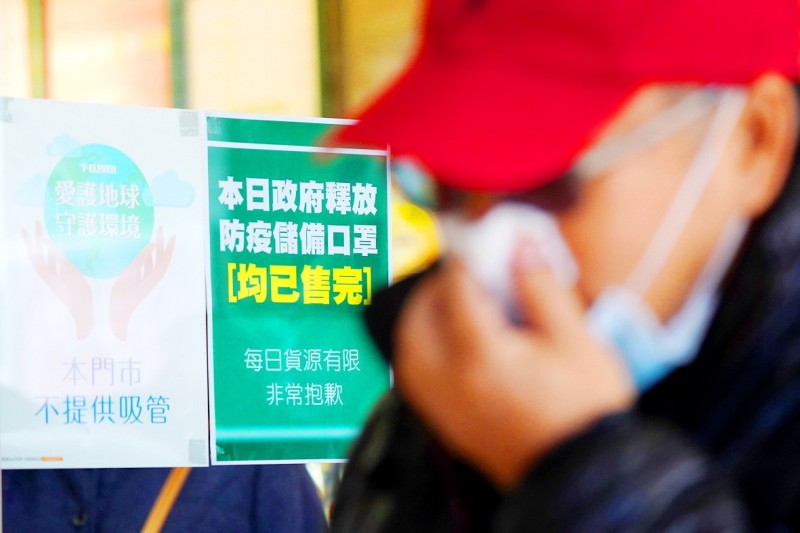《TAIPEI TIMES》Masks not a necessity, vice president says

A sign reading “The daily quota of masks distributed by the government for disease prevention is sold out” is taped to a door at a convenience store in Taipei yesterday. Photo: CNA
NINE GROUPS: Chen Chien-jen said people can be divided into groups according to how likely they are to be exposed to the virus, which can guide mask necessity
/ Staff writer, with CNA
Most people do not need to rely on surgical masks to prevent contracting 2019 novel coronavirus (2019-nCoV), Vice President Chen Chien-jen (陳建仁) said on Thursday, after reports that convenience stores had run out.
Chen, who is an epidemiologist by training, said that people with no symptoms of upper respiratory infection and fever can decide about wearing a mask depending on how likely they are to be exposed to the virus.
In Taiwan, potential exposure is most likely in three scenarios, he said.
First is from exposure to people who have tested positive for the virus, Chen said.
However, they have been placed in isolation, so they do not pose a public risk, he said.
Second, the virus can be passed on by those who have contracted it, but have not begun to display symptoms, he said.
Most commonly, these are people who have been in close contact with confirmed 2019-nCoV patients, such as family members and colleagues, or people who have returned from China’s Hubei Province, the epicenter of the outbreak, he said.
This group is subject to digital monitoring and compulsory home confinement for 14 days, which means the chance of being infected by them is low, Chen said.
Third, the virus can be transmitted via droplets from an infected person’s respiratory tract, he said.
However, it is unlikely for people to become infected if places that infected people have been are disinfected, he said.
People can be divided into nine groups according to how likely they are to come into contact with the virus, which guides whether a mask is necessary, Chen said.
Medical professionals are the first group and they are the most likely to be exposed to the virus, he said.
The second group is family members of people with 2019-nCoV, and the third, those who have been in frequent contact with an infected person, such as close friends and colleagues, he said.
The fourth group is public transport workers; the fifth is employees of enclosed entertainment venues; the sixth is people who have visited a hospital; the seventh people who use public transport, the eighth is customers at enclosed entertainment venues; and the ninth any who do not fit in the first eight categories, Chen said.
The list is intended to prevent undue panic and to allow masks to be used more efficiently, he said.
For the average healthy person, masks are not necessary to prevent 2019-nCoV infection, while the likelihood of contracting the disease remains relatively low, he said.
新聞來源:TAIPEI TIMES
















